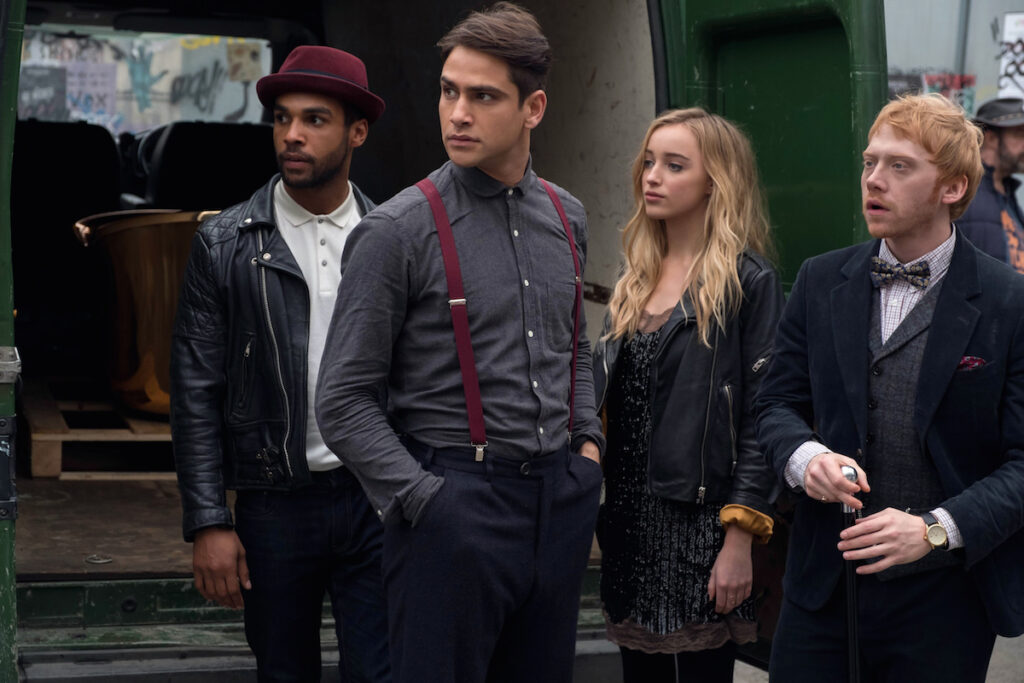What a strange weekend for anyone with a deep nostalgia for British films “Trainspotting” or “Snatch,” particularly if they saw them when they came out in 1996 and 2000, respectively. The former has been given a sequel (“T2 Trainspotting,” released in NY/LA this weekend) by the main creators with the original cast; the latter is given a new story in the form of a series with completely new characters and considerably far less entertainment value. The differing ventures speak to the productiveness of nostalgia: revisiting an old world is far more interesting through the perspective of its original inhabitants, as opposed to a new generation misunderstanding the nostalgia and just trying to make it look fashionable.
“Snatch” the series takes place roughly 15 years after the original events, with no one (that I can tell, or that was in the two episodes available to press) from the cast returning. Luke Pasqualino plays Albert Hill, a young hustler trying to break away from his criminal father Vic’s (Dougray Scott) influence, even if Vic has long been in jail and only communicates via FaceTime. Albert works with his posh, clumsy friend Charlie Cavendish-Scott (Rupert Grint, who also acts as executive producer), managing a young boxer named Billy (Lucien Laviscount). From the beginning, Albert owes people money that might even affect his mother’s florist shop, and the debt gets worse when Billy loses a fight he could have won. When trying to get back at a club owner named Sonny Castillo (Ed Westwick) who messed up their fight night payoff, and with the help of a tip from Sonny’s jilted girlfriend Lotti (Phoebe Dynevor), Albert, Charlie and Billy attempt to rob a van full of Sonny’s money. They realize soon enough that they’ve robbed the wrong van, stolen someone else’s gold, and that there’s footage of their makeshift heist on the internet, making them huge targets in the London underworld.
A “Snatch” story needs to be larger than normal life in all forms, especially with its characters, and that isn’t the case with the new roster introduced here. They’re more stylish in comparison to the grimy original cast—more familiar to a fashion runway than police line-up—but they still don’t give us any big laughs (Grint’s intended comic relief, especially) or even sympathy as their small-time hustles go haywire. The characters are imbued with some craftiness, as during the beginning heist that involves two forklifts, but even that speaks to how illogical the series will go for a cheap type of cool. The series’ attempt to add more women to the mix becomes superficial too, with characters like Lotti having little personality aside from being the girlfriend with an in. It goes without saying that the dialogue given to these pulpy characters lacks any of the required bite too, often leaning on cliches with zero sense of irony.
The biggest mistake is that this series wants to duplicate what Ritchie’s film feels like, which sets itself up for so many near-impossible expectations. The series starts with the same cloudy green color palette and the expanding ensemble narrative, but can’t build upon the resemblance. Instead, the stock nature of the series will just remind you of how carefully curated Ritchie’s movie is, including its carefully chosen soundtrack to the precise cinematography that led to numerous tight sequences of bollocks-out performances giving strange, now iconic monologues. Here, the series goes for the same snazzy, busy style, but feels the need to overcompensate with whooshing sound effects for its camera whips, and soundtrack track choices that mix the anonymous with the pivotal (like when Hasidic Jews suddenly take Molly and aggressively rap RUN D.M.C’s “It’s Tricky”). Whenever the series does amuse, like with a well-filmed boxing match in the first episode, it just makes you wish that “Snatch” had resigned to being a smaller, harmless series inspired by Ritchie’s cult classic, instead of a misguided enterprise that constantly stumbles while claiming its name.












